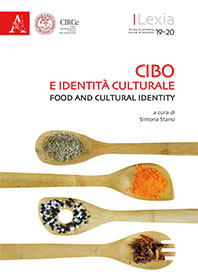Estratto da
LEXIA. RIVISTA DI SEMIOTICA
Cibo e identità culturale | Food and Cultural Identity
Il senso del buono. Dieci tesi per una teoria del food design
LEXIA. RIVISTA DI SEMIOTICA
Cibo e identità culturale | Food and Cultural Identity
Il senso del buono. Dieci tesi per una teoria del food design

ENGLISH TITLE: The Sense of Good: Ten Theses on a Theory of Food Design
ABSTRACT: Food design, the last among the stars of the design galaxy that holds very different fields under the notion of project, seems to be the answer to a world in which food has become a life philosophy. But what does “designing food” mean? And how can such an activity be theoretically supported? Ten theses to shed some light on a discipline whose implicit aim is to rethink food in relation to the human and social meaning it assumes:
1) There is no good except “good to think”;
2) Food design does not coincide with cuisine;
3) Food design does not consist in creating expedients but solutions;
4) Food designing always means re–designing;
5) Food design horizons are not objects but experiences;
6) Food designing produces taste identities;
7) The concept of terroir is the product of design thinking applied to food;
8) Tradition is an unaware form of food designing;
9) Food design considers gastronomic actors as hybrids;
10) Food designing presupposes a theory of signification.
KEYWORDS: food; design; good; strategy; meanings
ABSTRACT: Food design, the last among the stars of the design galaxy that holds very different fields under the notion of project, seems to be the answer to a world in which food has become a life philosophy. But what does “designing food” mean? And how can such an activity be theoretically supported? Ten theses to shed some light on a discipline whose implicit aim is to rethink food in relation to the human and social meaning it assumes:
1) There is no good except “good to think”;
2) Food design does not coincide with cuisine;
3) Food design does not consist in creating expedients but solutions;
4) Food designing always means re–designing;
5) Food design horizons are not objects but experiences;
6) Food designing produces taste identities;
7) The concept of terroir is the product of design thinking applied to food;
8) Tradition is an unaware form of food designing;
9) Food design considers gastronomic actors as hybrids;
10) Food designing presupposes a theory of signification.
KEYWORDS: food; design; good; strategy; meanings
| pagine: | 49-63 |
| DOI: | 10.4399/97888548857144 |
| data pubblicazione: | Giugno 2015 |
| editore: | Aracne |








